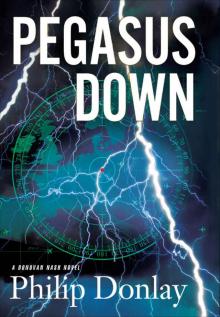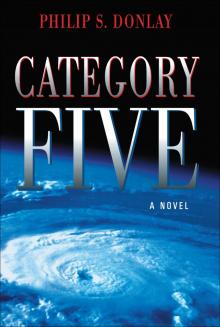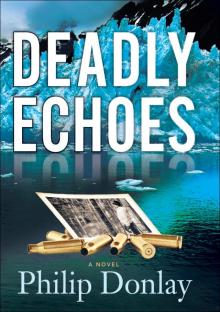- Home
- Philip Donlay
Deadly Echoes
Deadly Echoes Read online
DEADLY ECHOES
Also by Philip Donlay
Zero Separation
Category Five
Code Black
DEADLY ECHOES
A Novel
Philip Donlay
Copyright © 2014 by Philip Donlay
FIRST EDITION
All rights reserved. No part of this book may be reproduced in any form or by any electronic or mechanical means, including information storage and retrieval systems, without permission in writing from the publisher, except by a reviewer who may quote brief passages in a review.
This book is a work of fiction. Names, characters, businesses, organizations, places, and incidents either are the products of the author’s imagination or are used fictitiously. Any resemblance to actual events, businesses, locales, or persons, living or dead, is entirely coincidental.
ISBN: 978-1-60809-109-6
Published in the United States of America by Oceanview Publishing,
Longboat Key, Florida
www.oceanviewpub.com
2 4 6 8 10 9 7 5 3 1
PRINTED IN THE UNITED STATES OF AMERICA
For Kerry
You inspire me—
Acknowledgments
This book would not have been possible without the skilled law enforcement professionals around the world whose tireless work and dedication help keep our nation safe. Special thanks goes out to the United States Coast Guard, as well as the Federal Bureau of Investigation.
For their patience, friendship, and insight, I offer a heartfelt thanks to Rebecca Norgaard Peterson, Scott Erickson, Bo Lewis, Gary Kaelson, and Brian Bellmont. You’ve played a bigger part in all of this than you’ll ever know. For always giving me the unvarnished truth in a way that inevitably makes the stories better, Glenna Rossiter, Jonathan Mischkot, Kimberley Cameron, my brother, Chris; my parents, Cliff and Janet; and my son, Patrick. You’re an indispensible group of gifted people, thank you for keeping me on course.
A special thanks goes out to Dr. Philip Sidell, Dr. D. P. Lyle, and Dr. Paul F. Bruer for their remarkable medical expertise. As always, I’m most appreciative on many levels. A very special thanks goes to fellow creative souls, Richard S. Drury and Pamela Sue Martin. You encourage me to keep the faith, continue writing, and along the way always manage to teach me something.
I’d also like to thank dear friends and experts of all things nautical, Amanda and Joseph Dayton. For specialized knowledge about a myriad of subjects, thanks go to Margaret Buchanan, Laurie Savage, Arlene Chafe, and Braden Lusk. I’m the first to admit that I couldn’t have written this story without you. All of you have my eternal gratitude.
Finally, to the people who turn words into books. Thank you to my literary agency, Kimberley Cameron & Associates, you’re the best. Utmost praise also goes to my publisher: Patricia and Bob Gussin, Frank Troncale, David Ivester, Emily Baar, and Susan Hayes. You believed in this project, brought it life, and along the way, made it a better book. Thank you, Oceanview Publishing, there isn’t a better team anywhere.
DEADLY ECHOES
PROLOGUE
The Zodiac maneuvered quietly in the darkness, riding the mild swells of the Pacific Ocean. The sky was moonless, a perfect night for killing. The man in charge watched the Kaiyo Maru #7 through binoculars. The garish lights from the fishing vessel lit up the ocean, illuminating the screeching, circling ocean birds that wheeled above the carnage. The six-person team was dressed in black, each carrying an assortment of weapons. They motored confidently toward the larger ship, the stench of dead fish stronger as they drew near. The sound of the powerful winch hauling the ship’s catch helped mask the Zodiac’s approach. The leader focused his binoculars on the fisherman tending the long-line. The main cable ran for miles with monofilament line tied to a razor-sharp hook at one-hundred-foot intervals.
He watched with growing revulsion as each hook was stripped of its prize. The line had been set to run shallow, which also allowed for the indiscriminate catch of diving birds and sea turtles, their lifeless carcasses tossed back into the ocean. But most of the hooks held the fishermen’s target catch: sharks. They ranged from four to seven feet in length. Each shark was hauled aboard where every fin was expertly sliced off. Spewing blood, the shark was then thrown back into the water, still alive. The sharks could no longer swim so they sank. The lucky ones would quickly bleed to death, or drown, since sharks need to stay in constant forward motion for water to flow over their gills. Others would linger for days as they died of starvation. He’d seen footage of the butchery before, they all had, but to see it firsthand was like touching a match to the dry tinder of his outrage.
Using hand signals, he instructed his man to bring the Zodiac around, careful not to create a telltale wake. They motored in a slow arc until they were directly in the path of the Kaiyo Maru #7 then waited. As the one-hundred-sixty-foot vessel drew close, they matched the Zodiac to the speed of the ship and using rubberized grappling hooks, looped lines over the forward section of the hull. Once secured, five members of the team quietly boarded the ship leaving one man behind with the Zodiac.
Two of them hurried through a watertight hatch and disappeared into the superstructure; their job was to go below decks, secure the engine room, and then round up the crew below. Guns at the ready, the leader, flanked on either side by the remaining two members of his team, moved undetected toward the bridge. The captain was alone at the helm, leaning over a chart. At the popping sound of gunshots coming from below, he turned his attention to the instruments, as if searching for a mechanical reason for the unexpected noises. The three intruders burst through the hatch, guns raised. The man on the left spoke Japanese and ordered the captain to put his hands on his head. He emphasized his words by jamming the barrel of his machine gun into the soft skin under the captain’s chin. The captain immediately complied.
The leader gestured for the prisoner to step away from the controls. He knew that the fishermen would be no match for his skilled team. One by one, the reports from below confirmed that the crew had been rounded up and that the captured sailors were secured at gunpoint on the main deck. The leader glanced at his watch. Less than fifteen minutes after boarding, the ship and crew were his.
The leader pulled off his ski mask and ran his hand through his longish gray hair. He was tall, over six feet, but alarmingly thin. He may have been handsome once, but deep scarring marred his face and neck. It looked as if the skin around his eyes had been melted, and when he blinked, it appeared to take a great deal of effort. The person on his right followed suit, and the mask slipped off, revealing perfect olive skin accented by short spiky black hair. The woman was more striking than beautiful, green eyes radiated both self-assurance and intelligence. She was five foot seven, muscular like an athlete, yet slender. She smiled in a subtle way that implied that she was in control of her surroundings, confident that no matter the conflict, victory would be hers.
“Ask them how many in his crew.” The leader ordered his translator, who had elected to keep his mask on.
A flurry of Japanese was initiated by the man who still held his gun to the captain’s chin. The captain grunted a reply, his eyes wide with fear.
“He says there are twenty-one men plus himself.”
The leader raised the walkie-talkie to his mouth. “How many prisoners do you have?”
“We’ve got nineteen on deck. Two were killed and left below.”
“That’s everyone. Start filming. Make the crew finish reeling in the line, only be sure to release each fish. Pay particular attention to anything that comes up dead. Get it all.”
“Yes, sir.”
He turned to his translator. “Take the captain down on deck. We’ll be there in a minute.”
Once the bridge w
as theirs, he set down his machine gun and began to punch buttons on the navigation unit. It took him several minutes, but he finally programmed the autopilot to guide the ship on the course he’d chosen. After he double-checked the plot, he adjusted the ship’s speed and then made a discreet radio call to his own vessel to come and retrieve the team. The one-hundred-sixty-foot megayacht Triton was standing by just out of radar range and would be alongside in less than thirty minutes.
“How long will it take them to find this boat once we leave?” the woman asked.
“I set their speed for ten knots. Left undisturbed, they should arrive near land in a little over two days. We’ll be long gone before anything we’ve done is discovered.”
The walkie-talkie sprang to life, and his men down on the main deck reported that the last of the long line had been reeled in and all the fish released.
“We’re on our way down,” the leader replied, pulling his mask back over his head and carefully adjusting the material until the slits fit perfectly around his damaged eyes.
The woman replaced her mask then removed a small handheld video camera from her rucksack.
They both hurried down the gangway to the killing floor of the fishing vessel. The leader knelt down and picked up one of the knives the fishermen had been using to fin the sharks. It was a simple knife with an unremarkable wooden handle, but it would do the job. He glanced at the woman, she nodded and began recording. Two of his men grabbed the captain, the third man held an automatic weapon on the frightened crew. With a man on each side, the captain’s arms were stretched away from his body. Despite his violent struggles, the leader used the knife to cut away the captain’s shirt until the man was naked from the waist up. An expression of horror mixed with disbelief contorted his face. He began to moan and shake his head back and forth as they pulled a plastic wrap snug around his ankles.
This night had been twenty years in the making, and though it only represented the beginning, the leader knew he was about to taste the sweetness of revenge. He made a show of testing the sharpness of the blade on his thumb and then smiled as he moved toward the sobbing fisherman. As the knife parted flesh, he ignored the screams and felt an upwelling of elation. Everything was now set in motion.
CHAPTER ONE
At the sound of his phone, Donovan Nash was instantly awake. The caller ID told him the number was restricted and that it was 3:42 in the morning. He braced himself; nothing good ever came of a call at this hour. “Donovan Nash.”
“Donovan Nash,” a strained, raspy voice repeated. “I was hoping to speak to Robert Huntington.”
Donovan sat up in bed. Robert Huntington was a name he hadn’t used in over twenty years. A name only a handful of people knew—the man on the phone wasn’t one of them. “Who is this?”
“All you need to understand is that I know who and what you are. This is your wake-up call to let you know I’m going to destroy everything that’s important to you.”
“Don’t threaten me.” Donovan threw off his covers and launched himself out of bed, adrenaline pumping. He opened the drawer to the bedside table and grabbed his gun, went to the bedroom window, and peered at the street and driveway below. He saw no vehicles outside. Everything looked normal.
“Think of it as less of a threat and more of a promise. I can also assure you it will be a slow and painful destruction. Go to YouTube and find: shark payback. I’ll be in touch, Robert.”
Donovan could hear the deathly silence as the call ended. I’m going to destroy everything that’s important to you. The words replayed over and over in his head, and he appreciated the weight of the pistol in his hand.
He threw on pants and a sweatshirt but not before his eyes shot to the ugly scar that ran across his right thigh and the matching one on his right wrist. All products of a murderer armed with a knife. It had been seven months since he’d been attacked. The physical wounds of that night had mostly healed, but the scars were a constant reminder of what could happen if he let his guard down. With the pistol in hand, he slipped downstairs.
The house was nearly silent, only the soft hum from the refrigerator reached his ears. He thought of his wife and young daughter and for once was happy they weren’t here. Seven months ago Lauren had packed up Abigail and moved to Europe to get away from him. He’d tried to spin it any number of ways, but in the end it always came back to the simple truth. Lauren didn’t want to be with him—in fact she needed to be on another continent to feel comfortable. He missed his daughter terribly. They spoke often, and video-chatted nearly every day. He was thankful that his absence hadn’t seemed to dampen Abigail’s enthusiasm for life. He knew Lauren still loved him, but she didn’t want to live with him, nor did she want to be entirely without him. They were at an impasse, and he’d reached a sort of uneasy peace with the situation.
Donovan double-checked the alarm system and then went into the study, closed the drapes, and sat down at the computer. It didn’t take long to find the shark payback video. He clicked on the play icon and noted that it had already been viewed one hundred eighty-three times. He could tell at once this was an amateur video shot at night on a ship. The handheld image jumped and swayed, but the subject was unmistakable. Men wearing masks were pulling in a long line, except they were releasing the fish impaled on each hook instead of keeping them. Occasionally a dead turtle or ocean bird was hauled in and tossed onto the deck where it was closely photographed. A man dressed in black, holding a machine gun walked into view, and it was then Donovan understood. Someone had boarded a fishing vessel and stopped the fishing. The camera did a long, slow shot of the bloodstained deck, the plastic tubs filled with severed shark fins. Next, a container of fish that were still alive, gills opening and closing, straining, bodies flopping helplessly. Donovan knew this was what the industry called by-catch, fish that were cut into pieces to bait the thousands of hooks.
The homemade video panned upward and then zoomed in and focused on a lone fisherman. Shirtless, he was held so that his arms were outstretched, his ankles bound together. Moaning, and clearly terrified, he struggled in vain to get free. A single man came into the field of view and with little fanfare raised his knife and then the picture went black, but the audio recorded screams of agony. A simple web address flashed on the screen. Donovan quickly typed it into his browser and started the separate video. Without the constraints of YouTube, every horrific detail filled the screen.
Donovan watched as the fisherman’s detached arms were thrown into a plastic tub with the shark fins, and still alive and screaming, he was tossed overboard. The camera followed the doomed fisherman as he tried desperately to remain afloat but slowly sank from view. Still trained on the ocean, a Zodiac flashed past the camera. Shocked, Donovan instantly backed up the image and then froze the playback. Painted on the side of the rigid inflatable boat was the unmistakable gold logo and blue letters of Eco-Watch, the scientific research organization that Donovan had founded ten years ago.
Donovan let the video play to the end, to a message in bold print that nearly forty million sharks are killed each year to feed Asia’s market for shark fin soup. The view counter showed that over two thousand people had watched already. Donovan jumped back to YouTube and glanced at the early postings. The first two were riddled with poor grammar and typos; they congratulated Eco-Watch on killing the bastards. Then there were four more that labeled Eco-Watch a band of assassins and called for the arrest and immediate execution of every member of Eco-Watch responsible.
The shrill sound from the telephone on the desk startled him. It was a secure line installed by the Defense Intelligence Agency. Before she’d left, Lauren had worked part time for the DIA. She’d graduated with a Ph.D. from MIT in Earth Science and had gone to work for the government. In all the months since she’d left, that phone hadn’t rung once.
“Donovan Nash.”
“Donovan, it’s William. Sorry to wake you, but we need to talk.”
William VanGelder had raised him since he was fou
rteen years old. William had made a fortune in the oil business with Donovan’s late father, and in turn had amassed a vast fortune in both money and power since then. Nearing seventy-five years of age, William showed no signs of slowing down. He was still an active member of Washington’s political elite, a behind-the-scenes power broker with a long-held position within the State Department as an ambassador at large.
“You didn’t wake me,” Donovan replied. “Why are you calling on this phone?”
“We have a problem and we need to make some decisions.”
“I’m listening.”
“I just got a phone call from a nearly hysterical Beverly Stratton.”
“Wait. John’s wife?”
“Yes. She’d just been informed that her husband’s yacht had run aground in Hawaii. All aboard had been murdered, including John.”
“Oh, no.” Donovan felt all the air leave his body. John Stratton had been one of William’s closest friends, and by default, one of Donovan’s. John and William had gone to Harvard Law together. John had built a conglomerate of companies through a successful career as a venture capitalist. Always a major supporter of environmental groups, including Eco-Watch, John’s kindness and enthusiasm had a great deal to do with turning Eco-Watch into one of the premier privately funded scientific organizations in the world. Donovan owed the savvy venture capitalist a great deal. John’s megayacht, christened Triton, was his passion, and he and his crew were experienced and cautious seaman. Nothing about this made any sense.
“We don’t know much, but Beverly gave me a heads-up on one development. It’s the reason I called on the secure line.” William stopped as if collecting himself for a moment. “There’s a closed-circuit camera system on his boat, you know how John loved his gadgets. The Coast Guard played back the last images stored on the hard drive and found that whoever boarded the Triton were welcomed with open arms because they arrived in an Eco-Watch Zodiac.”

 Pegasus Down: A Donovan Nash Thriller (Donovan Nash Thrillers)
Pegasus Down: A Donovan Nash Thriller (Donovan Nash Thrillers) Category Five
Category Five Deadly Echoes
Deadly Echoes Speed the Dawn
Speed the Dawn Aftershock: A Donovan Nash Novel (A Donovan Nash Thriller)
Aftershock: A Donovan Nash Novel (A Donovan Nash Thriller) Seconds to Midnight
Seconds to Midnight Zero Separation
Zero Separation